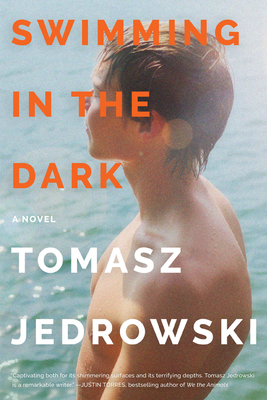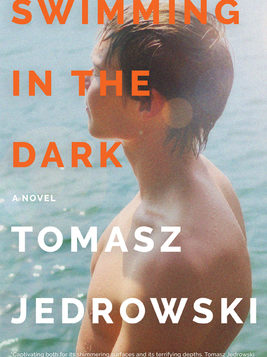 Swimming in the Dark
Swimming in the Dark
by Tomasz Jedrowski
William Morrow. 191 pages, $26.99
SET in Communist-era Poland in 1980, Tomasz Jedrowski’s first novel, Swimming in the Dark , is a compelling and tragic story in which two young men fall passionately in love. Jedrowski has woven a brilliant tale about two people in love who are torn apart by a political divide and a difference in values. It is also a unique perspective into a politically and socially dark period.
When Ludwik, the narrator, first meets Janusz, he is immediately captivated by Janusz’ brooding good looks and masculine appeal. The two men set off for a few weeks on a trip through Poland’s countryside, falling deeply in love.
Jedrowski carefully elaborates the differences between the two men. Through Ludwik’s graphic narration, we learn of his early struggle with his sexual identity, helped by his discovery of James Baldwin’s Giovanni’s Room (which intertwines with the story), and his growing frustration over his failure to find a life under Poland’s repressive regime. Ludwik has deeply ingrained values, which were formed early in his life. As a child, he would listen to Radio Free Europe in secret along with his grandmother in his mother’s bedroom. The message of freedom in the midst of Communist oppression forever shaped his thinking and his character.
Janusz, who had taken a job in the government, grew up very differently. He believed what he had been taught in school: “That the Soviets were our liberators. That they were the good ones. Our allies.” For Janusz, in order for their affair to survive, all they needed to do was mind their own business, “Avoid risks, be smart. As long as we do that, we’ll be fine.”
For Janusz, toeing the Party line was easy, as was soliciting help from powerful people in the Party to get ahead. Ludwik, on the other hand, could not sell himself out. Living in secret only increased his sense of fear as he strived to maintain his identity in a watchful city and with Janusz’ friends, who shared the Party’s political beliefs. This magnified his dissident opinions, which began to strain the relationship with Janusz.
Jedrowski’s descriptions of life in Warsaw are stark. The long lines to purchase food, the spikes in prices, and the inability to get proper health care sum up the desperation and frustration of the majority of Polish citizens. Jedrowski also paints a vivid picture of how luxurious life was for those in power. The contrast between the haves and the have-nots is striking.
Ludwik’s relationship with Janusz has moments of passion, emotional desolation, fatigue, and sorrow. Because of the secrecy of their relationship, Ludwik was always in a state of unfulfilled desire. As his anxiety about their future grew, along with their differing political views, conflict began to fester between them. As he states: “My life was a tiny narrow corridor with no doors leading off it, a tunnel so narrow it bruised my elbows, with only one way to go. That or the void, I told myself. That or leave.”
Reading James Baldwin’s Giovanni’s Room, Ludwik identifies with the main character, David, who endures guilt and despair over some his decisions and life choices. For Ludwik, the story served as a warning for his own life. Wanting to avoid making the wrong choices and then having to deal with the guilt later on, he suffers from a crippling hesitancy at times over what actions he should take.
This is a tender, sad, and moving love story. Jedrowski has created a fascinating tale full of suspenseful intrigue, conflict, and passion. His vivid descriptions of life in Communist Poland are riveting. The writing is lively and engrossing, creating tension and detail. Ludwik’s story is a personal narrative about love and loss, self-realization and freedom
William Burton is a writer based in Provincetown, Mass.






